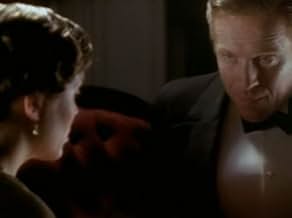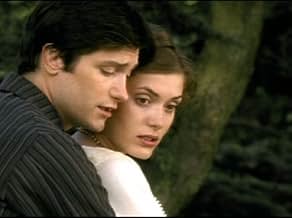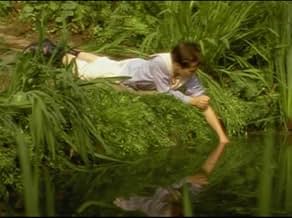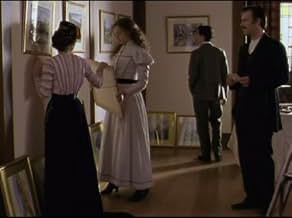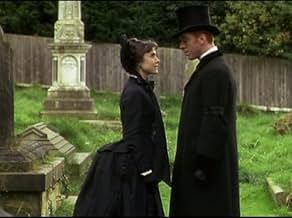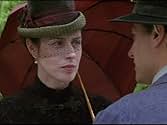Aggiungi una trama nella tua linguaChronicles the lives of three generations of the upper-middle-class British family, the Forsytes, from the 1870s to 1920.Chronicles the lives of three generations of the upper-middle-class British family, the Forsytes, from the 1870s to 1920.Chronicles the lives of three generations of the upper-middle-class British family, the Forsytes, from the 1870s to 1920.
- Ha vinto 1 BAFTA Award
- 2 vittorie e 4 candidature totali
Sfoglia gli episodi
Recensioni in evidenza
This is the sequel to the previous year's mini series, The Forsyte Saga, based on John Galsworthy's novel. It continues on with the dramatic lives of the younger generation of Forsytes, namely the forbidden romance between Fleur and Jon. Fleur is the daughter of Soames Forsyte, and Jon the son of Soames's former wife, Irene. Once again scandal, secrets, and deception dominate the tale. Like its predecessor, this saga has beautiful English scenery, finely furnished country manors, and lovely period costumes.
The story is interesting, though I personally find Fleur not a sympathetic heroine at all but instead totally self absorbed, deceptive, and manipulative. Jon is much more appealing, a young man with a deep love and respect for his parents. From their first encounter at an art gallery, the lovely & spoiled Fleur has made up her mind to have Jon for herself. Naturally their ill advised love affair opens up all the old wounds between Soames and Irene. In addition to Fleur and Jon, there is a likable third party to the love triangle... Michael Mont, who also vies for Fleur's affections. Essentially the conniving Fleur uses poor Michael for her own selfish purposes.
Actually, the most compelling part of the story for me remains the unfolding lives of the older generation, Soames and Irene. Soames is now wed to the unfaithful French Annette, and Irene is happily married to Jolyon. Especially given the drama with their offspring, will Soames ever be rid of his obsession with Irene, the wife who never loved him and is now married to another?
The story is interesting, though I personally find Fleur not a sympathetic heroine at all but instead totally self absorbed, deceptive, and manipulative. Jon is much more appealing, a young man with a deep love and respect for his parents. From their first encounter at an art gallery, the lovely & spoiled Fleur has made up her mind to have Jon for herself. Naturally their ill advised love affair opens up all the old wounds between Soames and Irene. In addition to Fleur and Jon, there is a likable third party to the love triangle... Michael Mont, who also vies for Fleur's affections. Essentially the conniving Fleur uses poor Michael for her own selfish purposes.
Actually, the most compelling part of the story for me remains the unfolding lives of the older generation, Soames and Irene. Soames is now wed to the unfaithful French Annette, and Irene is happily married to Jolyon. Especially given the drama with their offspring, will Soames ever be rid of his obsession with Irene, the wife who never loved him and is now married to another?
I have not seen the original film or read the book, so I have a fresh perspective on this version of The Forsyte Saga. It is a brilliantly acted, emotionally stirring film. Damian Lewis is outstanding. He brings such intense emotions to the character of Soames. I don't know if it's the character but I like to think it's his acting that makes you almost feel sorry for this man. How can you feel sorry for someone who, on the surface can be so cruel? Well, that is the genius of Damian Lewis! He brings such passion to the complex character of Soames that you can't stop watching it! He expresses so realistically the repressed emotions of the character. I feel that is what makes this film so moving, it's so human. The film displays w/such heartache(thanks to the acting) the struggles and human complexities of individuals forced to stay within the expectations of their repressed society. The actors effectively display how the characters desperately need & want love and acceptance, but don't have a clue how to obtain it, although some do find love eventually. I definitely recommend this film to anyone who likes period type/costume dramas which showcases brilliant acting. And if you don't know Damian Lewis, this is an excellent introduction to his work!
I had never heard of The Forsyte Saga before seeing the mini-series but I enjoyed it so much that I bought the novel, and isn't that really what these adaptations of novels are all about- trying to interest people enough to read the book the movie was based on? I'm glad this version wasn't completely true to the novel considering that so many of the characters in the novel are either underdeveloped or so enigmatic that it's hard to have any kind of feelings about them.It was a stroke of genius to develop Dartie and George into the two jokers of the family, who provide light entertainment when the plot gets a little dark. In defense of Gina McKee, I think the choice to cast her as Irene was a wise one. I can't think of any other actress today who has such an elegant, classy beauty without being "showy" about it and I thought her characterization of Irene was true to how she is portrayed in the book, considering that Galsworthy deliberately made Irene a very shadowy, unreachable figure. Ioan Gruffudd, who, with his dark good looks just seems to be made for these lavish period pieces, was his usual dashing and charming self playing "The Buccaneer" and the rest of the cast put in a fine performance. While I admit these costume drama mini-series aren't to everyone's taste, you can not doubt the painstaking hard work put in by all involved that makes them a cut above the rest.
Comparisons between the 60s version of this splendid work and the latest one are difficult because they were both great. I have really enjoyed the last version especially as regards the performances of Damian Lewis and Gina McKee.
One previous contributor said that he found himself almost liking Soames which 'we were not supposed to do'. Is that right? Galsworthy intended The Forsytes to be representative of the upper middle class with some bad aspects - arrogance, lack of sentiment, conscious always of their respectability - but also with a positive side - sturdy, determined, ambitious, but ultimately concerned with ownership and property. Soames is an extreme example of his kind, to the extent that he regards people - especially his wife - as potential property. Irene, on the other hand, represents the new force which, along with the effects of WWI and the rise of the Welfare State, nationalisation etc will soon overthrow the old order.
Superficially at least, Soames is the villain. He appears to terrorise his wife, physically abuses her and more. However, is there another side to this? Irene marries him quite cynically for materialistic reasons. It's not merely a question of 'not loving' him. He positively makes her flesh creep right from the start. We are given the idea that she is forced to marry him by her stepmother and by her poverty. Force her?? As the story goes forward, we see that she is a strong character - no-one can force her to do anything. Her poverty? She has £50 per annum from her father. This might not seem a lot, but it was about what an artisan earned in a year at that time (on which he was expected to keep a family). Despite his treating her as property, Soames does love Irene in his way and he does try his best to give her what she wants. In return she is openly unfaithful to him, denies him children and even conjugal rights. As regards his bad treatment of her, she certainly returns the compliment in kind. She could be looked on as something of a vampire - she sucks the life force from Soames and old Jolyan and wantonly destroys the happiness of her friend June and Bossiney (though admittedly he goes along willingly). As regards her own son her hatred of Soames tempers her dislike of Fleur so even her son is badly affected by her force of character and neurosis.
I think Galsworthy, as well as writing a simple commentary on Edwardian and Victorian life was also trying to divide his readers into factions - the pro-Soames camp who like the old ways, and the pro-Irene (the 'new woman' camp) who wanted change.
Whatever, I have to congratulate Gina McKee. She carried off that complex character of Irene so well. Her enigmatic Mona Lisa smile, did it display goodness? Or the opposite? I'm still not sure
One previous contributor said that he found himself almost liking Soames which 'we were not supposed to do'. Is that right? Galsworthy intended The Forsytes to be representative of the upper middle class with some bad aspects - arrogance, lack of sentiment, conscious always of their respectability - but also with a positive side - sturdy, determined, ambitious, but ultimately concerned with ownership and property. Soames is an extreme example of his kind, to the extent that he regards people - especially his wife - as potential property. Irene, on the other hand, represents the new force which, along with the effects of WWI and the rise of the Welfare State, nationalisation etc will soon overthrow the old order.
Superficially at least, Soames is the villain. He appears to terrorise his wife, physically abuses her and more. However, is there another side to this? Irene marries him quite cynically for materialistic reasons. It's not merely a question of 'not loving' him. He positively makes her flesh creep right from the start. We are given the idea that she is forced to marry him by her stepmother and by her poverty. Force her?? As the story goes forward, we see that she is a strong character - no-one can force her to do anything. Her poverty? She has £50 per annum from her father. This might not seem a lot, but it was about what an artisan earned in a year at that time (on which he was expected to keep a family). Despite his treating her as property, Soames does love Irene in his way and he does try his best to give her what she wants. In return she is openly unfaithful to him, denies him children and even conjugal rights. As regards his bad treatment of her, she certainly returns the compliment in kind. She could be looked on as something of a vampire - she sucks the life force from Soames and old Jolyan and wantonly destroys the happiness of her friend June and Bossiney (though admittedly he goes along willingly). As regards her own son her hatred of Soames tempers her dislike of Fleur so even her son is badly affected by her force of character and neurosis.
I think Galsworthy, as well as writing a simple commentary on Edwardian and Victorian life was also trying to divide his readers into factions - the pro-Soames camp who like the old ways, and the pro-Irene (the 'new woman' camp) who wanted change.
Whatever, I have to congratulate Gina McKee. She carried off that complex character of Irene so well. Her enigmatic Mona Lisa smile, did it display goodness? Or the opposite? I'm still not sure
The screenwriter has once again decided to rewrite the story. Read the book (actually books) to find out all the differences. For example, in the book the governess leaves on her own & refuses any extra pay, Young Jolyon is seen visiting her flat & the gossip starts - that's when Jolyon's wife and father first learn anything is going on. The changes go on and on. If you have ever seen the 1967 version, it would be hard to beat Eric Porter as Soames.
Lo sapevi?
- QuizThe series as it is shown on Amazon Prime divides Season One into eight of approximately 55 minute each, and Season Two into five episodes. Whereas, it was originally shown as six episodes for Season One, and four episodes in Season Two.
- Citazioni
Soames Forsyte: You know nothing about it. Your friendship with her was a sham!
June: Yes! She stole the love of my life, my future. I should hate her but the alternative was you. I cannot hate her. I can only wonder why she did not do it sooner.
- ConnessioniFeatured in The Best of Masterpiece Theatre (2007)
- Colonne sonoreIrene's Song
(End titles music)
Music by Geoffrey Burgon
Lyrics by Jacqueline Kroft
Performed by Bryn Terfel
I più visti
Accedi per valutare e creare un elenco di titoli salvati per ottenere consigli personalizzati
- How many seasons does The Forsyte Saga have?Powered by Alexa
Dettagli
- Data di uscita
- Paese di origine
- Siti ufficiali
- Lingua
- Celebre anche come
- La saga de los Forsyte
- Luoghi delle riprese
- Croxteth Hall, Muirhead Avenue East, West Derby, Liverpool, Merseyside, Inghilterra, Regno Unito(James and Emily's home)
- Aziende produttrici
- Vedi altri crediti dell’azienda su IMDbPro
Contribuisci a questa pagina
Suggerisci una modifica o aggiungi i contenuti mancanti

Divario superiore
What is the Brazilian Portuguese language plot outline for The Forsyte Saga (2002)?
Rispondi







